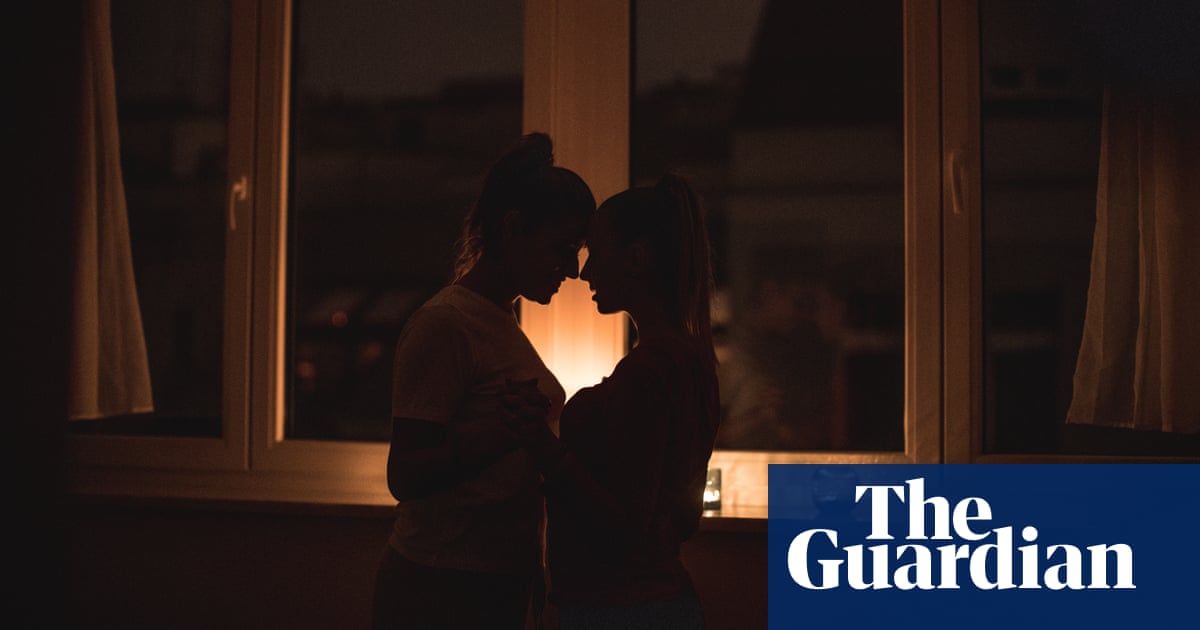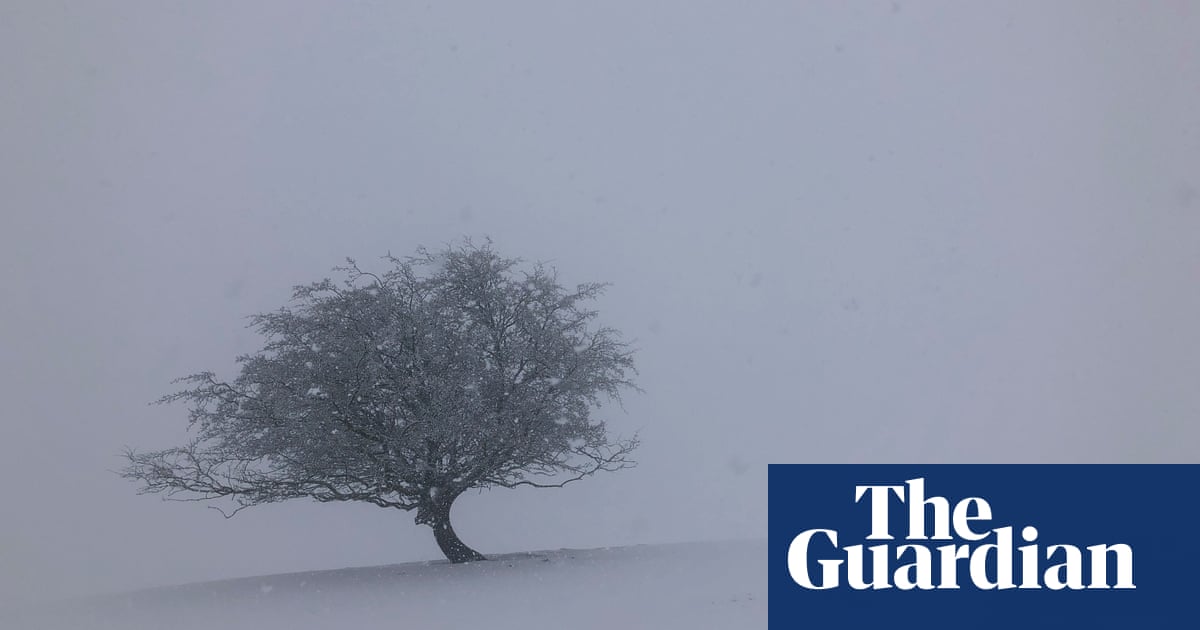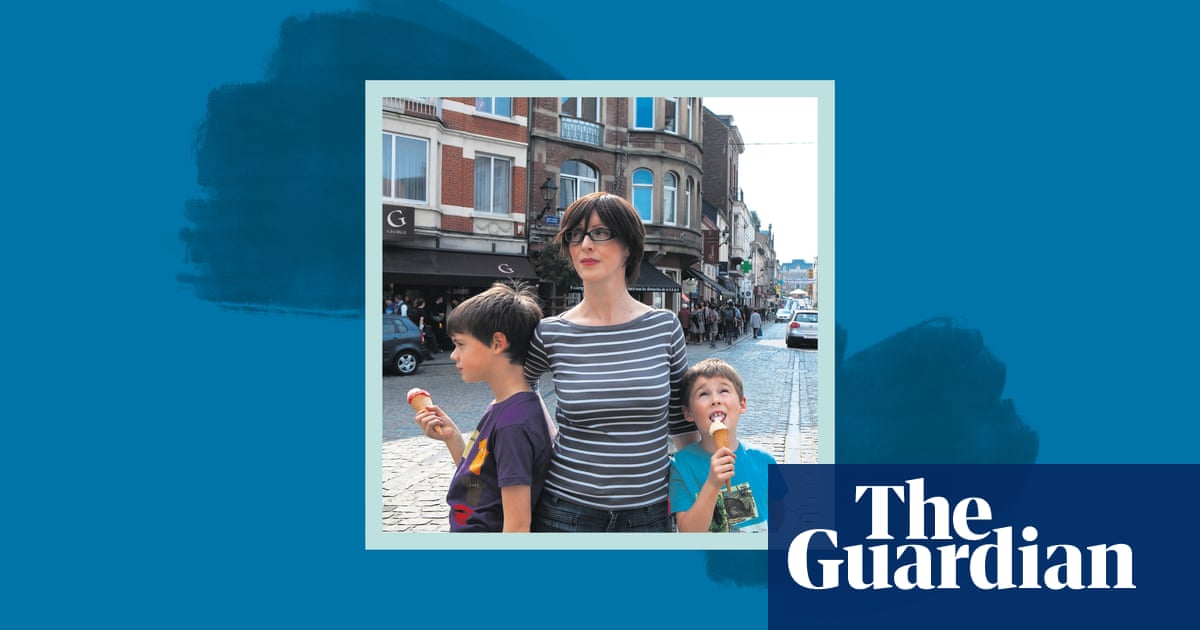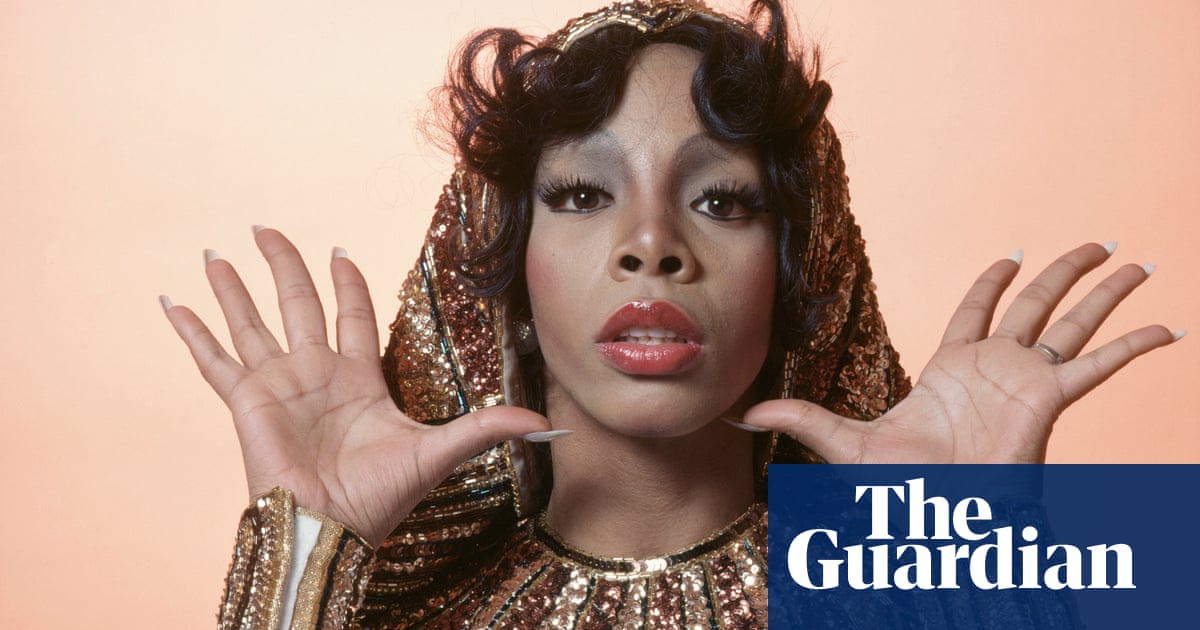
It is mid-morning in Nashville and Kacey Musgraves is padding around her new home, looking in the fridge and checking on her dogs while she talks. She moved in in April, after spending a year having it renovated. From what I can see on Zoom, the results of her renovations are exceptionally tasteful, in a very upmarket boutique hotel way: everything – walls, furniture, the floor – seems to be in shades of muted, natural off-white. As with the breakfast she’s just finished – which involved a very specific kind of rosemary sourdough, an equally specific kind of slow-cultured, grass-fed butter “from this place in Atlanta” and a “pretty fucked-up” Japanese machine that steams bread – it seems to suggest someone doing very well for themselves, which indeed Musgraves is.
In 2018, her fourth album, Golden Hour, finally broke through, fulfilling the line about her that people had used from the start: “The country star for people who hate country music.” It went platinum in the US, made the top 10 in the UK, topped umpteen end-of-year critics’ lists and won four Grammys, including album of the year. It’s not unknown for a country artist to receive the latter award – the [Dixie] Chicks won it in 2007, as did Taylor Swift in the days when she was still country’s brightest young star rather than an all-conquering pop behemoth, and Glen Campbell in 1969 – but it doesn’t happen often.
Even the Nashville music business establishment, which has occasionally given the impression of viewing the left-leaning Musgraves as a thorn in its side rather than a bright new star, felt impelled to laud its success: it won album of the year at the Country Music Association awards and Academy of Country Music awards, the latter garnering Musgraves a trophy topped with a Stetson hat. Its success catapulted her to a different level of fame, where respectful critical acclaim is replaced by the tabloids taking an interest in your personal life, the makers of Scooby Doo come calling, asking you to appear in cartoon form as Daphne’s Nashville-based “bestie”, and you pal around with supermodels and model yourself – she took Gigi Hadid with her to the Country Music Association awards and is the face of Moschino’s latest ad campaign.
It’s also a world in which Harry Styles asks you to tour with him and Elton John invites you round to his Berkshire country pile for tea (“He told me there was supposed to be a secret tunnel from his house to Windsor Castle but he’d never been able to find it, and I was like, ‘You have a tunnel to a castle? Do you live in Narnia? What the fuck?’”) and where your more outlandish ideas about creativity are indulged, including having a four-poster bed installed in a recording studio, the better for you to record your vocals from. “Well, I found the bed on Facebook Marketplace – it was like 400 bucks from someone in Birmingham, Alabama,” Musgraves says, lest anyone who’s seen pictures of said bed in situ on social media think it an extravagance. “It was sitting right in the middle of the studio, dressed with all this beautiful drapery and wonderful flowers, and it was not only beautiful and inspiring to look at, but it was really symbolic. We did a lot of recording in that bed. It was my Brian Wilson moment.”
As if to crown her ascendancy, at the end of 2019 she sang the closing theme for Disney’s Frozen II, and hosted her own Christmas TV special, which on paper looked a little hokey – it was based around Musgraves searching for her grandma’s old decorations while preparing for a party and being interrupted by a host of celebrities, including James Corden, Kendall Jenner and the Radio City Rockettes – but turned out to take a very Musgraves kind of approach. It was influenced by Wes Anderson, narrated by Dan Levy of Schitt’s Creek and featured a script that, in between renditions of Rockin’ Around The Christmas Tree and Let It Snow, snarked about celebrating “a corporate holiday in the current political climate”.
But a few months after her Christmas special, America went into lockdown. That in itself wouldn’t have been a huge problem for Musgraves: she was exhausted from touring and needed to “let my adrenals calm down”. But her 2017 marriage to country singer Ruston Kelly – the inspiration for much of Golden Hour, which came thick with songs describing him as her “velvet Elvis” and wondering if the pair knew each other in another life – was unravelling.
She isn’t big on the specifics of what happened, beyond that being away on tour so much didn’t help, but the pair divorced in July 2020, less than three years after they were married. “I think if the pandemic hadn’t coincided with such a massive life change, I could have just coasted for another couple of years, shoving myself full of distractions,” she says. “It was a kind of luxury in disguise, being able to have the time to sit there and work through things.”
The divorce meant songs flooded out of her. “There’s nothing more relatable than sadness. Actually, going into Golden Hour, I was nervous that I was going to be completely fucked when it came to creation, because at that point in my life I was happy. It was nice to know that you didn’t have to suffer to create good art. I’m glad I had that experience, and this, I think, just allowed me to dig even more into the pain I was feeling, the trauma.”
By the start of 2021, she had written 40 songs, “a time capsule of all my feelings over the last year”. They were sad and beautiful and filled with painful telling details: one, Picture Roll, found her ruing a late-night decision to scroll through old photos on her phone; another, Hookup Scene, recoiled with horror from the prospect of having to go out dating again. She started recording a new album – the emotional antithesis of Golden Hour – but “there was no overarching concept, I didn’t have an album title”.
So Musgraves embarked on what seems a fairly radical solution, both to the emotional fallout from her divorce – the need, as she puts it, “to transform my trauma and my pain into something else” – and her creative issues: she had a seven-hour, therapeutic-guided psilocybin mushroom trip. She has been open about her recreational drug use (among her Christmas songs lurks one about leaving hash cookies out for Santa and the necessity to remain “high as the angel on top of the tree” throughout the holiday season, while Golden Hour featured Mother, a song about her mum texting her after Musgraves had taken LSD) but this was “deeply guttural, spiritual, terrifying” – she spent a not insubstantial amount of the experience sobbing – “but also extremely useful”.
“I did it with a doctor friend here and her husband. It’s called plant therapy,” she says. “It’s been looked at in a lot of areas for help with depression, anxiety, addiction, so many things. Basically, some neuroscientists [from Baltimore’s Johns Hopkins University] have created a playlist that’s music from all over the world, put together to guide you, in that state of mind, through different emotions, feeling memories, whatever. We have these neural pathways that we have worn into our brain, kind of like trails in the forest, and what these plants do is basically dump six feet of snow on those pathways and allow you to form new neural connections, to change your brain, change your habits. Through the experience, I was blindfolded, and on a comfortable couch with a soft blanket, this music was playing and all the things I was seeing were in my mind’s eye. The music was painting this whole story, pulling from childhood memories, experiences, thoughts. I was feeling every pluck of a string in my body, senses start to mix, you feel colours… it’s so hard to explain. The day after, you’re encouraged to journal and relisten to the playlist, triggering some of the emotions that you felt then. So that’s what I was doing the day after, when the word Star-Crossed popped into my mind as a title, and the concept of a modern tragedy, the acts: the exposition, the climax and the downfall, then the resolution.”
The whole business sounds terrifying to me, but you can’t fault Musgraves’ voluble enthusiasm. “I don’t want it to necessarily speak for my brand as a whole,” she frowns, “but it was a big part of this process.”
And yet in a sense this kind of thing is part of her brand. Guided mushroom trips, rewiring the neural pathways in one’s brain, developing the structure and title of your album while flooded with hallucinogens: she isn’t the only country artist to discuss this kind of stuff – Sturgill Simpson’s acclaimed 2014 album Metamodern Sounds In Country Music delved into the subject of its author’s hallucinogenic experimentation – but it marks her as an outlier. So does the film she’s made to accompany the Star-Crossed album, an hour-long exercise in “heightened reality”, co-starring Schitt’s Creek’s Eugene Levy. The trailer features Musgraves in a wedding dress, having surgery performed on her and attacking crockery with a ninja sword and battalions of identical-looking Stepford Wives and drag queens. It looks nuts, but she was “letting my creative gut guide me”. “It’s hard to feel like you’re acting when you’re putting a face to the real emotions you experienced as the writer of the songs. I look at it like I got to relive my actual life, just more metaphorically, on camera, and a year later.” Then again, you could tell Musgraves is not your regular country superstar just by listening to her music, which has a tendency to leap without warning from down-home acoustic songs to electronic pop, Fleetwood Mac-ish soft rock to breezy disco. At one juncture in the mid-2010s, she announced she was thinking of making a reggae album: it never happened, and perhaps that’s for the best, but the sense of an artist thinking far beyond standard musical boundaries and declining to be constrained by expectations is hard to miss.
The weird thing is, her early life story suggests that a regular country superstar was precisely what Musgraves was fated to become. She grew up in Golden, Texas, a town that has a population of less than 200. “I guess you guys would call it a village, but there’s nothing there. You roll through and there’s one little market shop where you can buy a packet of smokes and maybe a Lotto ticket, but it was so small, it didn’t have a school. I did a lot of playing outdoors. We had dial-up internet but no cable TV. My mom’s a visual artist, a creative painter, so she had no patience with any complaining about being bored.”
With nothing else to do, Musgraves became “known as the girl who sings”. She learned the mandolin, won yodelling competitions and, aged 12, formed a duo called the Texas Two Bits with a local girl. They were what Musgraves describes as “a rhinestone-wearing hat act”, billed as the Yodelling Cowgirls, singing songs called things like Yodel Your Troubles Away and May The Good Lord Take A Likin’ To Ya on the local country circuit, even making an album. “I think it set me up for what I do now and created a pathway I’m really thankful for,” she says. “But it was not easy sometimes. Being the only kid that’s not going to the sleepover or the dance because I’m two or three hours away, singing these old country songs for old folks. It felt like you were missing out on a little bit of real life, and I’m still dealing with that today.”
She persevered with her musical career, writing her own songs under the tutelage of a local guitar teacher, even entering Nashville Star, a country answer to The X Factor, coming seventh (“I don’t think music is meant to be judged in that way, it’s not created to be reviewed by a panel,” she says). It wasn’t until she moved to Nashville and found a job as a staff writer for a music publisher that she realised how at odds she was with industry. “I remember being repelled by some of the stylistic norms that were expected around then for a female in country music – subject matters, style choices, things I didn’t find myself being inspired by. I was thinking, I’m not going to do this if that’s how it is.”
Just how at odds was revealed when Musgraves, aged 24, put out her debut album proper, 2013’s Same Trailer Different Park. It was released by a major Nashville label, but its contents caused a degree of uproar, particularly a song called Follow Your Arrow. “Kiss lots of boys, or kiss lots of girls if that’s something you’re into,” it advised. “When the straight and narrow gets a little too straight, roll up a joint – or don’t.”
As Musgraves points out, this was pretty mild stuff, but it was enough to get the song more or less banned by country radio and for the lyrics to be censored at the Country Music Association awards. She found herself wondering if the reaction would have been the same were she a male songwriter. “If you look at the roots of country music, the songs that Willie Nelson has written or Hank Williams wrote, it’s no darker than them. So I find the double standard interesting. It’s not groundbreaking heathen ideas I’m writing about – but also not surprised because I know that country is the last bastion of the music industry that has a problem with things that other genres don’t. So I went into it knowing I was pushing some buttons, but also thinking that was ridiculous at the same time. I was told that Follow Your Arrow would tank on country radio and they weren’t wrong, it did.” She smiles. “But it brought a whole legion of fans my way, so it was worth it.”
The song earned her plaudits from some august figures – not least Nelson, who called her “a huge talent” – and it gave journalists something to write about: Musgraves the “liberal misfit” and vocal supporter of LGBTQ+ rights, in a musical world where such subjects are seldom broached; Musgraves the one-woman crusade against the trend of “bro country”, a successful hip-hop-influenced sub-genre that revolved exclusively around the topics of beer, trucks and babes in shorts; Musgraves who, one magazine headline claimed, was “making country music good again”.
She worked hard to establish herself outside a Nashville context: she was as likely to be found touring with pop stars including Katy Perry as she was sharing a bill with Merle Haggard. She developed a sizeable gay following and took aim at those who had shunned her on her second album, Pageant Material: “Don’t want to be a part of the good ol’ boys’ club, cigars and handshakes, appreciate you but no thanks.” She made it clear she didn’t want to be seen as a well-meaning, left-leaning protest singer – “I don’t want to ruminate on the things that are wrong with the country,” she told the Observer in 2019 – but she also kept speaking out: against Alabama’s abortion laws; in favour of greater inclusivity in the country scene and gun control, an onstage outburst about the latter occasioning the wrath of Fox News, whose presenter Ainsley Earhardt demanded to know “what is happening to country music? What happened to wholesome country singers?” Earlier this year, when Republican senator Ted Cruz left Texas for a holiday in Cancun in the middle of a winter storm that left millions without power or drinking water, she sold T-shirts reading CRUZIN’ FOR A BRUISIN’ on her website, donating the proceeds to charities that were dealing with the crisis. “It was wildly popular! So popular!” she laughs. “Nothing will band humanity together like someone doing something really stupid.”
She clearly didn’t expect Golden Hour to become the kind of success that it did, despite the fact that it offered a poppier take on her sound, despite the laudatory reviews and the fact that one of its singles, Rainbow, was quickly claimed in some quarters as an LGBTQ+ anthem. The footage of her when it won the Grammy for album of the year, repeatedly mouthing, “Oh my God”, “What?” and, in her words, “making a ridiculous face”, became an online meme. But she seems to have dealt with celebrity well: she is glamorous but unstarry, the business with the four-poster bed in the studio notwithstanding, and more friendly and open than you might expect from someone who has the gossip columns speculating whether an extremely good-looking Nashville doctor is her new partner and whether she unfriended an old pal on social media after seeing photos of her with her ex-husband. “I’m lucky the album that was the most successful for me came at the end of my 20s. I feel pretty unchangeable at this point. And I work hard to keep attached to reality. Being detached from reality is one of my greatest fears. I’ve seen it a lot of times in the industry, getting to work with artists I looked up to, and I would be astounded at how detached from reality they were. It scared the shit out of me, so I never want to be like that.”
She says she has some trepidation about following a breakthrough album with something as personal and downcast as Star-Crossed. “You can look at it as an added outside pressure to match [commercially] what you did last time, or you can say, ‘Holy fuck, last time I won four Grammys on top of the other two I already had, thus I have been set for total creative freedom’.”
Total creative freedom includes how she’s going to present herself onstage in the future, a topic she’s been chewing over: after all, she says, she comes from country music. “If an audience is going to see Alison Krauss or Willie Nelson, they’re coming to hear songs, they’re not coming to see flash.” And now she has a wider audience and “the opportunity to put on a more pop-style production. There’s part of me that loves the flash, and this album lends itself to being really theatrical, almost like a borderline fantasy, but I want my songs to translate if it’s just me and my guitar. It’s a balancing act.” She smiles. “I’ve thought about bringing the four-poster bed onstage.”
No, she says, she’s not worried about having to perform night after night, singing songs that remind her of getting divorced – she was more worried about singing songs from Golden Hour, that reminded her of the happiest days of her marriage. “I was pretty stressed out about that, but I’m happy to report that, as I’ve gone on in my journey of self-discovery through this, I don’t have those fears any more. Also,” she adds, “meeting someone and becoming happy, I feel like I can now relate to Golden Hour in a new way, through a new person, and I just feel the magic of that album doesn’t have to die with that relationship.”












